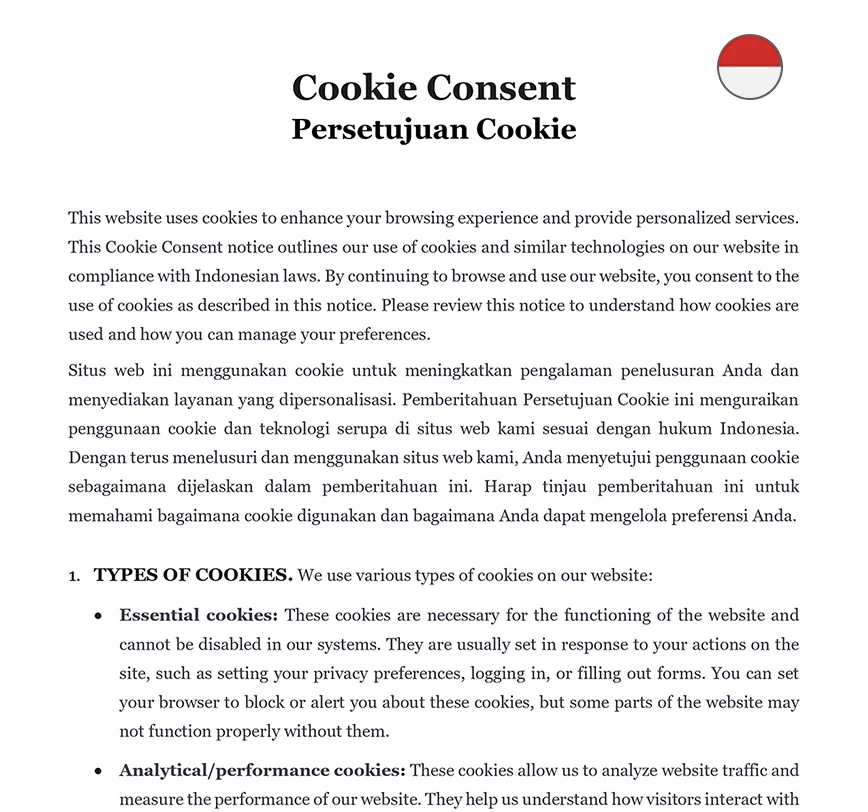Ready to use legal template
Drafted by experienced lawyers
Indonesian-English translation
Ready to use legal template
Drafted by lawyers
Indonesian-English translation
Home › Intellectual property › Cookie Consent
Learn more about Cookie Consent in Indonesia
In Indonesia, a cookie consent is a document or notice that informs users about the use of cookies on a website or online platform. It serves as a means to inform and obtain consent from users for the collection, processing, and use of their personal data through cookies, in line with Indonesia’s Law No. 27 of 2022 on Personal Data Protection. The document details the types of cookies utilized, their purposes, and provides users with the ability to manage or opt out of them. Themis Partner offers you an easy to edit Cookie Consent drafted by lawyers to comply with the law in Indonesia.
Table of contents
-
What are cookies in Indonesia and why are they used?
-
What is the legal basis for requiring cookie consent?
-
What should it include under Indonesian law?
-
How does it inform users about the use of cookies?
-
How long should it be retained by website owners?
-
Are there penalties for non-compliance to indonesian law?
-
What if I don’t have a Cookie Consent
What are cookies in Indonesia and why are they used ?
Cookies are small text files that are stored on a user’s device (such as a computer or mobile device) by websites they visit. They serve various purposes and are commonly used in web browsing. Cookies enable websites to remember specific user preferences, such as language settings, login information, or items in a shopping cart. They also help track user behavior and provide personalised experiences by collecting data on website usage, pages visited, and interactions. These insights allow businesses to improve their websites, offer targeted advertising, and enhance user experiences. Cookies can be session-based, which are temporary and expire once the browsing session ends, or persistent, which remain on the device for a longer period. While cookies generally enhance user experiences, their use has raised privacy concerns, prompting regulations and policies to protect user data and ensure transparency in cookie usage.
What is the legal basis for requiring cookie consent?
The legal basis for requiring cookie consent in Indonesia is primarily established under Law No. 27 of 2022 on Personal Data Protection (PDP Law). This law mandates that valid consent must be obtained for any processing of personal data, which includes the use of cookies on websites. The consent must be in writing, whether manually or electronically, and in Bahasa Indonesia, although bilingual formats are allowed as long as Indonesian is one of the languages. This requirement ensures that users are informed about the use of cookies and have the option to consent to or refuse the collection and use of their personal data through such means
What should it include under Indonesian law?
1. Explanation of Cookies
Provide a clear and easily understandable explanation of what cookies are, how they work, and their purpose in relation to the website or service.
2. Types of Cookies
Describe the different types of cookies used on the website, such as essential cookies, functional cookies, analytical cookies, and third-party cookies. Explain the specific functionality and purpose of each type.
3. Data Collection and Usage
Clearly state the types of data that cookies may collect, such as IP addresses, browsing history, or preferences. Explain how this data is used, whether for website analytics, personalization, or targeted advertising.
4. Third-Party Cookies and Tracking
If third-party cookies are used, disclose the names of the third-party providers and explain their purpose. Inform users about any tracking technologies, such as pixel tags or web beacons, and their implications.
5. Cookie Management
Provide information on how users can manage and control cookies. Explain how to opt-out of non-essential cookies or change cookie settings through browser preferences or cookie consent tools.
6. Consent Mechanism
Explain how users can provide consent for cookie usage, such as through a pop-up banner, checkbox, or settings panel. Make it clear that continued use of the website implies consent to the use of cookies.
7. Revoking Consent
Inform users about their right to withdraw or revoke cookie consent at any time and provide instructions on how to do so.
8. Cookie Duration and Expiry
Specify the duration for which cookies are stored on the user’s device and when they will expire.
9. Privacy Policy
Refer to the organization’s Privacy Policy for more detailed information on data protection, user rights, and data sharing practices.
10. Updates to the Cookie Consent Document
State that the cookie consent document may be updated or revised periodically, and provide a date indicating the last update.
How does it inform users about the use of cookies?
The cookie consent informs users about the use of cookies by providing clear and comprehensive information. It explains what cookies are and how they work, ensuring users understand their purpose and functionality. The document describes the different types of cookies used, such as essential, functional, analytical, and third-party cookies, and provides details on the specific data they collect and how it is used. It also discloses any tracking technologies and the implications they may have for user privacy. The document explains how users can manage and control cookies, including options to opt-out or change cookie settings. It outlines the consent mechanism, clarifying that continued use of the website implies consent to the use of cookies. Additionally, the document highlights the user’s right to revoke consent at any time. By presenting this information in a clear and accessible manner, the document empowers users to make informed choices regarding their cookie preferences and ensures transparency in the use of cookies on the website or service.
How long should it be retained by website owners?
In Indonesia, the retention period for personal data, including data collected through cookies, should be clearly stated by the data controller prior to obtaining consent from the personal data owner. The data controller is also required to cease all processing of personal data once the retention period has lapsed. However, the specific duration of the retention period is not explicitly defined in the PDP Law and may vary depending on the nature of the data, the purpose of the data processing, and other relevant laws and regulations. It’s important for website owners to establish a retention period that complies with the PDP Law and to inform users accordingly in their privacy policy or cookie consent document.
Are there penalties for non-compliance to Idonesian law?
In Indonesia, penalties for non-compliance with data protection regulations are outlined in Law No. 27 of 2022 on Personal Data Protection (PDP Law). The PDP Law empowers authorities to investigate and enforce actions against entities that violate data protection rules. Non-compliance can lead to administrative sanctions such as warning letters, suspension of data processing activities, deletion of personal data, and administrative fines up to 2% of the annual revenue. Additionally, criminal penalties include imprisonment for four to six years and monetary fines ranging from IDR 4 to 6 billion (approximately USD 285,000 to USD 430,000). For corporations, the monetary penalty can be ten times the maximum amount imposed on individuals. It’s crucial for organizations in Indonesia to adhere to the PDP Law to avoid these significant penalties.
What if I don’t have a Cookie Consent
If you don’t have a cookie consent notice on your website in Indonesia, you may be in non-compliance with the Law No. 27 of 2022 on Personal Data Protection (PDP Law). While the use of cookies is not specifically regulated, to the extent that cookies contain personal data, the provisions applicable to personal data will also apply. This means that valid consent must be obtained for any processing of personal data, which includes the use of cookies on websites.
Failure to comply with these regulations can result in administrative sanctions, such as warning letters, suspension of data processing activities, deletion of personal data, and administrative fines. In severe cases, non-compliance can lead to criminal penalties, including imprisonment and substantial monetary fines. It’s essential to ensure that your website’s use of cookies aligns with the PDP Law to avoid these potential consequences.
SPECIAL OFFER
eCommerce
5 Document Package
Essential website/app policies for online business in Indonesia
Share information
Why Themis Partner ?
Make documents forhundreds of purposes
Hundreds of documents
Instant access to our entire library of documents for Indonesia.
24/7 legal support
Free legal advice from our network of qualified lawyers.
Easily customized
Editable Word documents, unlimited revisions and copies.
Legal and Reliable
Documents written by lawyers that you can use with confidence.




